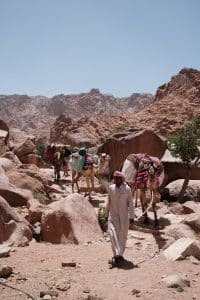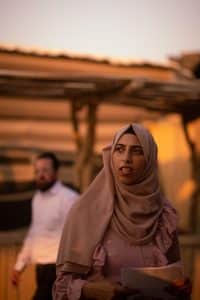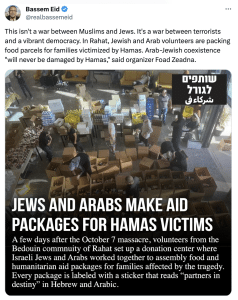“Kul maktub,” the grief-stricken Bedouin man assured his visitor… and also himself. “It’s all written”, meaning it was just destiny playing itself out as God willed it. Or was it? We all have our ways of dealing with loss and tragedy, and this is theirs. Israeli Bedouins are predominantly Muslim, and in Islam there is the fatalistic idea that God has ordained everything. It’s all written, and that’s just how it’s going to be. Good and bad, we just accept our lot. But sometimes we have to ask, we have to protest: did this really have to happen? Was this God’s will?
The Bedouin community has been impacted by the evil events of October 7th just as much as any other. Bedouin children have been killed, men murdered in their tents, and several Bedouin are among those now held hostage in Gaza.
But equally, they also feature among the stories of great heroism coming to light in the aftermath of the massacre.
Bedouins are part and parcel of Israel, past, present, and future.
Bedouins in Israel
Hamas missiles had just murdered several schoolchildren, so Shalom Weil, CEO of the Yesodot Center for Torah and Democracy, went to visit the superintendent for Bedouin schools in the Negev desert. As the bereavement and casualty official for schools in the south of Israel, Weil wanted to offer condolences from the state of Israel to this Bedouin community for their loss.
 The superintendent, named Joma, explained to Shalom Weil that the community would consider his visit a great honor. He was not wrong. They were greeted with traditional hospitality in one of the designated tents of mourning. Weil describes the scene:
The superintendent, named Joma, explained to Shalom Weil that the community would consider his visit a great honor. He was not wrong. They were greeted with traditional hospitality in one of the designated tents of mourning. Weil describes the scene:
“A line of barefoot men, eyes red from crying, are standing outside in the sun, waiting for us. Salaam alaikum, handshakes, blessings, and a hand on the heart to signify pain and consolation. Joma and I pay our respects sitting cross-legged on the colorful woven carpet, while the mourners are on their knees. One of the children approaches us with bottles of water, the second brings dates, and the third comes with a finjan pot of bitter black coffee.”1
The are approximately 200,000-250,000 Bedouins living in Israel today, mostly in the Negev region—in Beersheva and the surrounding area. Bedouins are an ancient tribal people, nomads primarily from the Arabic peninsula who started arriving in the Holy Land about 500 years ago onwards. Since then, many have settled permanently in tents and huts in the Israeli desert, while others stay semi-nomadic. Israeli Bedouin may not be quite as mobile as in the past, but many traditions and conventions have been kept till this day. Modernity has crept into much of life, but they still maintain a conservative and traditional culture, and are an integral part of Israeli society.
Blood brothers
The Bedouin have a blood pact with the Jewish people that existed from before 1948, while the Jews were resisting the British Mandate that refused them entry even during the Holocaust. The events hitting the Bedouin today and the horrors inflicted on Israel by Hamas have only strengthened that pact.
 The two children had been playing outside when a rocket hit. The families are devastated. Weil recounts that one of the sheikhs shared more of the horrors Hamas perpetrated against the Bedouins on that awful day:
The two children had been playing outside when a rocket hit. The families are devastated. Weil recounts that one of the sheikhs shared more of the horrors Hamas perpetrated against the Bedouins on that awful day:
“One woman from the community was working out in the fields, dressed in her long black traditional, modest robe. Hamas terrorists shot 42 bullets into her and then further mutilated her body.”
Another Bedouin family from Rahat saw murder in cold blood by Hamas terrorists who had infiltrated on October 7th. The fact that they were clearly Arabs made no difference. “You’re more Jewish than the Jews!” the terrorists yelled, before killing the father and shooting a five year old boy named Atallah in the chest. Somehow he survived.2
On that same day, a Bedouin minibus driver from the same town became a national hero after rescuing 30 Israelis from that ill-fated party in the desert.
“When I think about it, I ask how did we get out of there… I guess it’s fate that we’re meant to live longer in this world.”
Youssef Ziadna explained how he received an emergency call to pick up nine people from the rave much earlier than expected. It soon became clear this was not a standard emergency. “Bullets were flying everywhere,” Ziadna relayed. “I stared death in the face, but I knew I couldn’t give up on my missions. I will go and rescue them… I told them to bring as many as possible.” According to the Jerusalem Post, Ziadna managed to cram 30 into his minibus designed to carry 14 people, some of whom were shot and wounded, while a Hamas paraglider hovered overhead firing a machine gun indiscriminately at the people below. Knowing the area well, he chose little known routes that would save their lives, also showing other cars the way of escape. Several people from Rahat were wounded in the massacre and five are reported missing, four of whom are from Ziadna’s family. More than that, Ziadna says he has received death threats from Gaza for saving Jewish lives. As much as he may be hated by Hamas, he has become a hero in Israel, and has even been invited by Israel’s embassy in Dubai to tell his story there. “I would never wish on anyone to see what I saw,” Ziadna told the Jewish Telegraphic Agency. “This is trauma for my whole life. When I sit alone and recollect, I can’t help the tears.”3
The mayor of Rahat, Ata Abu-Madighem, has been campaigning for bomb shelters and reinforced rooms for years. 75,000 Bedouins share just 10 shelters in Rahat, and many of those living in tents have no shelter at all, a fact that the mayor insists must be addressed: “The state must make a mental switch and start respecting the Bedouin community”.
“After this, the government needs to do a better job of looking after us because we’re also part of this nation,” Ziadna says in agreement. “We are one people — we are Israelis. We live here together and we need to go hand in hand.”
It is written
These horrors are too much to bear. How do you process it? How does the human heart handle such grief? Exposure to such extreme evil? “It’s all written”. It’s God’s will. It had to be this way, and God knows best. Well. That’s the Muslim take on it. But as believers, what is our take? It it all inevitable? The Bible says in Psalm 139 that our days written in God’s book before one of them came to be. Does that fix our destiny?
Make no mistake, God’s ultimate thoughts, plans and purposes cannot be thwarted. But God has designed the world so that we have free will even as He remains sovereign. We live in freedom, not fatalism. God can see our actions ahead of time, but just as a parent watching their kid take a fall, seeing an action is not the same as causing it—or desiring it. God can see everything in the past, the present, and in the future just as easily. He is outside of time, and can observe the beginning and end simultaneously, like someone holding a ruler.
He can see where we’re going and what will happen, but has given us agency to make our own choices. And He is a master weaver, weaving man’s evil actions together with His rescue and redemption into His great tapestry. Just ask Joseph.
After being abused, left for dead, sold into slavery, and falsely imprisoned, Joseph sees that ultimately God turned it all to good. It all got woven into the plan. Were those things God’s will? God’s desire? No. Did He foresee it all and work His redemptive brilliance until it conformed to His perfect will for Israel and the world? Yes.
“As for you, you meant evil against me, but God meant it for good, to bring it about that many people should be kept alive, as they are today.” (Genesis 50:20)
The Destiny of Israel and the Bedouin people
Did God want Hamas to rape, plunder and slaughter? Absolutely not. But our God hates control so much that He graciously gives us such freedom that He would rather permit the evils of October 7th than control us. It’s not for nothing that God gave Israel the choice at Sinai to choose life and blessings or death and curses. It’s a real choice, and the Hamas terrorists made some catastrophic decisions. Evils such as those of October 7th can be foreseen by God, but are not “Inshallah”: not His desire or will. Even when allowing suffering to happen, God does not willingly afflict His children:
For he does not afflict from his heart
or grieve the children of men. (Lamentations 3:33)
God is deeply pained at our suffering. He has seen it all coming, and He can still work with both good and bad to accomplish His ultimate purposes. He is lightyears ahead of the worst plans that anyone—even Satan himself—could ever dream up. It is all foreseen, including His ultimate plan to deal with evil, even before one of us came to be. He will ultimately rescue and vindicate Israel in the sight of the whole world when Jesus returns, and all the bitter fighting over land will come to an end. God will establish peace once and for all, allotting the Bedouin people and all the peoples of the land, an inheritance alongside the tribes of Israel:
“So you shall divide this land among you according to the tribes of Israel. You shall allot it as an inheritance for yourselves and for the sojourners who reside among you and have had children among you. They shall be to you as native-born children of Israel. With you they shall be allotted an inheritance among the tribes of Israel.In whatever tribe the sojourner resides, there you shall assign him his inheritance, declares the Lord God.” (Ezekiel 47:21-23)
 In the meantime, our Bedouin blood brothers in the town of Rahat have set up a donation center, and are joining together with other Jewish and Arab volunteers to help make aid packages for the victims of the Hamas terror attacks.
In the meantime, our Bedouin blood brothers in the town of Rahat have set up a donation center, and are joining together with other Jewish and Arab volunteers to help make aid packages for the victims of the Hamas terror attacks.
Their motto is “Partners in Destiny”. This is the sticker slapped on each one of the parcels in Hebrew and Arabic.
We know from the Scriptures that there will be worse to come. It’s all written but we get to participate and play a part. Our choices for good or evil, for or against God’s laws really matter. There really is a way to freedom and eternal life in Jesus for all who choose Him. It’s all written. God is allowing evil to reach its fullness before He comes in judgment. But let me tell you, the ending is really good.
- Times of Israel, Mourning with our Bedouin blood brothers, Shalom Weil, October 23, 2023
- Yael Bar Tur on X
- Jerusalem Post, Bedouin bus driver saves 30 people from the Negev rave massacre, By Deborah Danan /JTA, October 20, 2023
Photo by Teodor Kuduschiev on Unsplash















